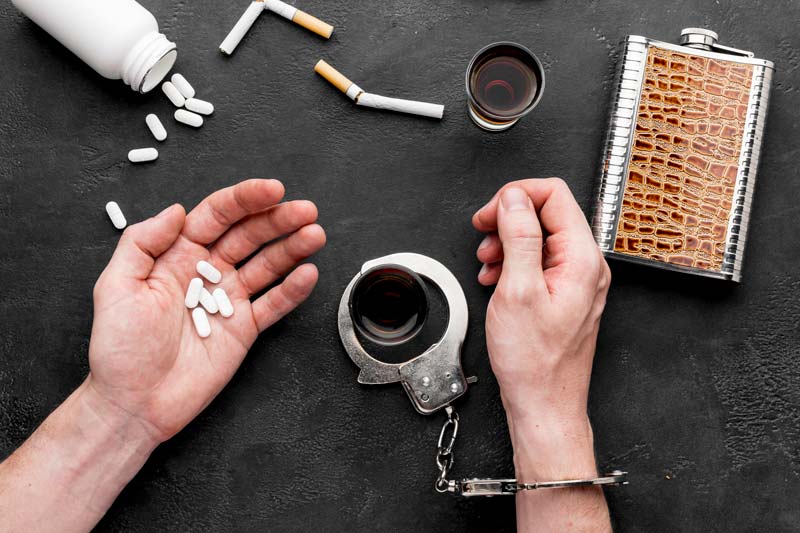
Addiction is a challenging foe to fight. However, it’s essential to understand that addiction is not a sign of weakness nor an indication of a flawed character and moral failure. It is a common condition that millions of people worldwide fight every day, regardless of age, background, ethnicity, and socioeconomic status.
According to the National Survey on Drug Use and Health, around 20.4 million people in the U.S. were diagnosed with substance use disorder (SUD). Unfortunately, only 10.3% of them received treatment. While there’s no single cause of addiction, people with substance addiction still have hope, and there are many ways to treat it effectively.
Here at DOCS Urgent Care & Primary Care Fairfield, we do our utmost best to help our patients with SUD treat their addictive tendencies. We do so with compassion and empathy. As the leading urgent care in Fairfield, CT, we are determined to help every patient of ours with our addiction recovery treatments.
We’ve compiled a list of ways to help our patients recover from their addictions.
Unbeknownst to many, addiction is more than willingly succumbing to substance abuse. In reality, it is a disease. Addiction, often clinically referred to as substance use disorder (SUD), is a diagnosable complex mental condition that prevents a person from abusing particular substances despite its severe health and social consequences.
Repeated substance abuse can change a person’s brain functions. And whenever a person has SUD, they tend to build up tolerance towards the substance, making them immune to the intoxication they experienced when they tried the substance for the first time. This means they need larger amounts of said substance to feel its effects.
If you have SUD, it doesn’t mean you’re flawed. You’ll need long-term management and a lifetime commitment to deal with your addiction. Here at DOCS Urgent Care & Primary Care Fairfield, we urge people around those who have SUD to be more compassionate and empathetic with what they’re experiencing. However, it doesn’t mean you must tolerate and support their addictive tendencies.
Unfortunately, there is no cure for addiction. No panacea will eliminate your addictive tendencies and keep you clean and sober for good. Drug and alcohol rehab centers aren’t the cure as well. They can only provide tools and support and set you on a proper path. However, you can’t solely rely on them to deal with your addiction. It remains in your hands to remain sober and maintain your path to recovery.
This is also one of the reasons why many people refer to themselves as “recovering addicts.” This term is a permanent reminder that they must be vigilant in keeping their addictive tendencies in check. They must continually remind themselves to use the necessary tools and support to keep themselves clean and sober.
As mentioned above, addiction is a lifelong process that requires the addict to remain vigilant and alert at all times. There is no cure for addiction, no panacea, and there’s certainly no “one-way ticket” to recovery. People suffering from substance abuse are encouraged to find the best method or technique for them and use it to stay on the path to recovery. For example, many SUD-diagnosed individuals find meditation helpful, while some people don’t find it useful at all.

Many recovering addicts fail to realize that “living sober” and “getting sober” are two entirely different things.
Getting sober is the first step to recovery. It involves a great deal of courage, self-awareness, and willpower, not to mention a solid support system. Getting sober means dealing with uncontrollable cravings, resisting urges, and ignoring all the addictive thoughts that will bug you throughout a specific period. It also means shrugging off that voice in your head telling you to drink wine today because you deserve it and understanding it’s merely a craving and it will pass.
On the other hand, living sober is what comes after getting sober. It’s the calm after the storm. It’s just as big of an achievement as getting sober and requires tons of work. Living sober involves using all the tools and support systems you’ve acquired to live a clean and sober life while managing all the emotional triggers that may cause you to relapse again. Ultimately, living sober is all about making the necessary lifestyle changes that will lead to personal growth and effective long-term addiction recovery.
If you’re a recovering alcoholic, smoker, or drug user, you might’ve tried to replace your substance of choice with something less potent. You might’ve done this to avoid the effects of relapsing, or you might have just wanted to enjoy your addictive tendencies, only now on lower doses. However, this is a tricky process, and many urgent care in Fairfield, CT, and addiction treatment centers discourage you from doing so.
Swapping your substance from another harbors dangerous consequences. Doing so can strengthen your old habits and patterns, only now in the guise of a less dangerous substance. Experts recommend going cold turkey, meaning complete abstinence from your addiction. But before you go cold turkey, we highly recommend you seek the help of urgent cares in Fairfield, CT, first so you can follow an effective treatment plan instead of going in blind with your addiction cessation process.
Relying on happy thoughts can only get you so far. The same sentiment can be said for positive affirmations and good intentions. However, addiction recovery is more about taking action, whether small steps or giant leaps. What’s worse, the disconnect between your intentions and actions can lead to dangerous consequences.
If you genuinely want to recover from your addiction, you must take the necessary steps daily. It may be as simple as walking with your dog for 15 minutes or jotting down every emotion and craving you’ve had for the day in your journal. To make things even better, you can align your intentions with your actions and strengthen your habits into something beneficial for your addiction recovery process and, ultimately, your growth.
There’s more to addiction recovery than meets the eye. Eliminating alcohol in your home can do only as much if you always go down the bar at the end of the day. Simply abstaining from substance use can only get you so far. And if you’re continuing your existing bad habits while abstaining from addictive substances, you’re on the fast track to relapse.
Effective addiction recovery requires its participants to overhaul their lifestyles. It may mean disengaging from the activities you previously participated in, eliminating bad company, and ultimately, your mindset. Lifestyle change is arguably one of the most challenging parts of addiction recovery, but it is one of the most effective ways to get and live sober.
If you’ve been on the path of addiction recovery for quite some time now, you’ve probably realized how much time, energy, and vigor you now have. This is the perfect opportunity to take care of your overall health. Proper diet and exercise are key players when it comes to addiction recovery. And the more you take care of your overall physical and mental health, the less likely you are to relapse.
Self-care is a crucial aspect of addiction recovery, and many urgent cares in Fairfield, CT, like DOCS Urgent Care & Primary Care Fairfield, highly encourage it. Your mind and body are your allies in your addiction recovery journey, and they will serve you well if you take care of them properly.
As a recovering addict, you may find it overwhelming to deal with your current situation, especially when you simultaneously have to improve many aspects of your life. Addiction recovery is all about making the necessary changes, and we all know that change can be difficult, especially if you feel like you need to change many habits and mindsets simultaneously.
Urgent cares in Fairfield, CT, recommend you take things one step at a time. Start by focusing on one thing first. Once you master it, hop on to the next while remaining vigilant about the last change. The more you focus on things individually, the more you’ll realize that you’re walking the path to addiction recovery the farthest.
One of the biggest pitfalls many recovering addicts suffer is thinking that relapse is a form of failure. Let’s make things crystal clear here:
RELAPSE IS NOT EQUAL TO FAILURE.
As a recovering addict, it’s in your best interest not to relapse. After all, you’ve done all the hard work, and there’s no valid excuse to relapse by now. But when you do, you don’t need to criticize yourself and make yourself feel like a failure. Relapsing, as hard as it may seem, is a part of addiction recovery. Just remember to get yourself up on your feet and get back on the track of addiction recovery as soon as humanly possible.
Remember this. Relapsing doesn’t mean you’ve failed. It doesn’t also mean you’re a failure. You’re a brave and impressive person for standing up to your addiction and doing all you can to deal with it.

Our DOCS Urgent Care & Primary Care Fairfield team will stand beside you as you approach addiction recovery. To help you with your recovery, we offer addiction recovery treatment that can help you ease your substance dependence. You can effectively start your recovery journey with counseling and the proper social support.
Contact us today to learn more about how we can help you with your addiction recovery.


During this surge in COVID-19 cases, our primary focus is meeting the high demand for tests, and we are seeing higher than usual wait times. This means we are unable to answer most phone calls. Please know that our teams are working very hard during this time to care for as many patients as safely as possible. Please click the button below for answers to common questions. We appreciate your understanding.